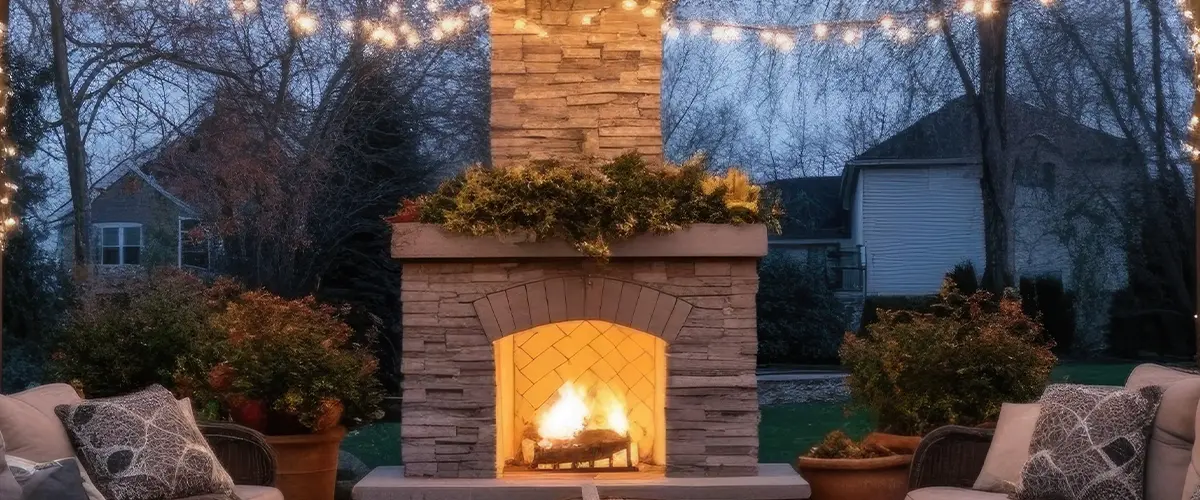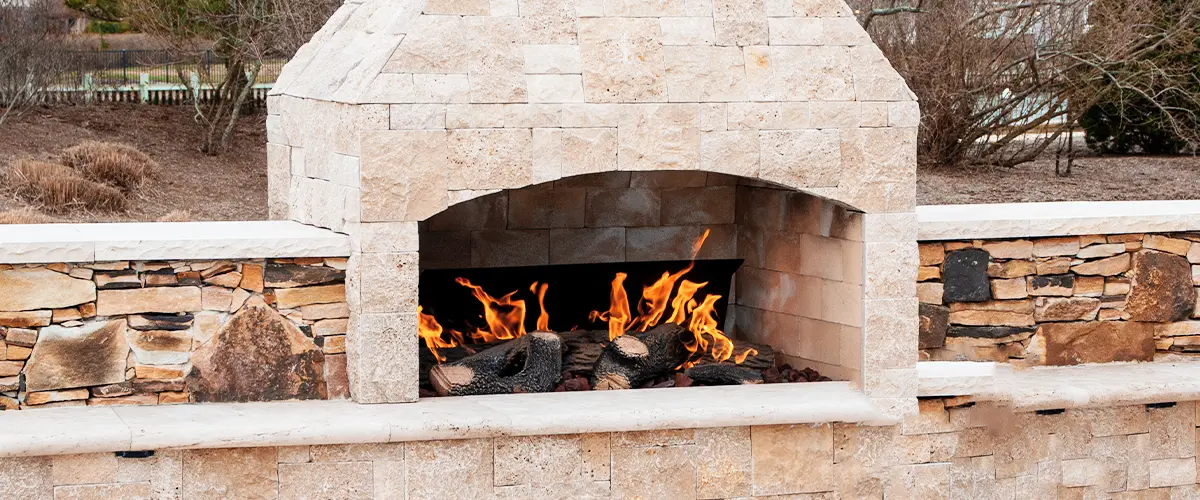When it comes to selecting materials for your new or remodeled fireplace, the decision between cinder block and concrete block is crucial. Both materials are often considered interchangeable, yet they have unique properties that can significantly influence the efficiency, safety, and longevity of your fireplace.
Cinder blocks are lighter and offer better insulation because of the coal ash content, which can be a double-edged sword in terms of durability when exposed to high heat. On the other hand, concrete blocks provide exceptional strength and fire resistance, making them a steadfast choice for a heavy-duty fireplace structure.
So, which is the best?

Understanding Cinder and Concrete Blocks
Understanding the key differences between cinder and concrete blocks is crucial when selecting the appropriate material for your fireplace, as it will affect longevity, maintenance, and performance.
Let’s delve into what sets these two types of masonry blocks apart to ensure your hearth stands strong and functions efficiently.
-
Cinder Blocks
These are lighter and offer better insulation due to air pockets, helping retain heat and save energy. Made from a mix of coal ash, aggregate, and cement, they’re a budget-friendly choice but less durable compared to concrete blocks.
-
Concrete Blocks
Composed of cement, sand, aggregate, and water, these blocks are denser and stronger, making them ideal for withstanding high heat and pressure. They’re a preferred choice for fireplaces due to their durability and ability to handle heavy loads.
| Features | Cinder Blocks | Concrete Blocks |
|---|---|---|
| Durability | Prone to crumble over time | Highly durable, resistant to wear and tear |
| Heat Resistance | Less heat resistant due to porous structure | Retains heat, suitable for fireplaces and heat sources |
| Aesthetic Appeal | Minimalist, industrial look | Versatile appearance, can be textured or plain |
| Cost | Usually cheaper than concrete blocks | Can be more expensive than cinder blocks |
| Ease of Maintenance | Requires regular sealing and painting | Low maintenance, sealed blocks aren't as visually appealing |
More to read: Your Ultimate Guide To Your Brick Fire Pit
Choosing the Right Block for Your Fireplace
When building a fireplace, consider these factors:
- Heat Resistance
Concrete blocks are superior in handling heat, crucial for fireplace safety.
- Strength and Durability
If you need a robust and long-lasting fireplace, concrete blocks are the way to go.
- Insulation and Energy Efficiency
Cinder blocks provide better insulation, helping keep rooms warmer with less fuel consumption.
- Cost Considerations
Cinder blocks are generally more affordable than concrete blocks.
- Environmental Impact
Cinder blocks are more eco-friendly, using coal by-products, while concrete requires more resources to produce.
- Local Regulations
Always check local building codes before starting your project, as they may dictate the type of block you can use.
- Installation and Labor
oncrete blocks are heavier and may require professional installation, while cinder blocks are easier to handle.
- Aesthetics
Consider the look you want to achieve. Cinder blocks offer a more textured appearance, whereas concrete blocks provide a smoother, more uniform look.
Let Land Designs by Colton assist you in determining whether cinder or concrete blocks are the right fit for you. Contact us today at (720) 580-3677 for expert guidance and personalized solutions.

FAQs
Yes, cinder blocks can be used to create the structure of a fireplace. However, it’s crucial to ensure that the cinder blocks are fire-rated and in good condition. Any blocks showing visible cracks or damage should not be used, as they can compromise safety.
It is important to use concrete blocks that are sturdy and fire-resistant. They should be properly cured to handle the intense heat of a fire. Additionally, use fireproof mortar designed for high-temperature applications to join the blocks together securely.
Yes, it is common to construct the main structure of a chimney using concrete blocks. However, the construction must meet fire safety standards and local building codes. It’s important to consult with a professional to ensure compliance and safe construction.
ou can check with the manufacturer or supplier to ensure the cinder blocks have been tested for fire resistance. Fire-rated cinder blocks will have documentation or markings to indicate their fire-resistant properties.
Yes, you can paint your fireplace to match the décor of your room. Use heat-resistant paint intended for use on fireplaces, and follow the manufacturer’s recommendations for application to ensure the paint adheres to the blocks despite the heat.
Regularly inspect the condition of the blocks and mortar. Repair any cracks or gaps in the mortar to maintain the structural integrity. Also, keep the fireplace clean of ash and soot, as it can lower the temperature at which the fireplace is effective.
Always have your fireplace inspected by a professional before the start of the heating season. They will check for any signs of damage and ensure that the structure is sound. Remember to maintain adequate ventilation to prevent the buildup of dangerous gases.
Maintenance and Care Tips for Your New Fireplace
A well-built fireplace can be a source of warmth and comfort for years to come. Proper maintenance and care are essential to ensure its longevity and safe operation. Here are some tips to help you keep your fireplace in top condition:
- Regular Cleaning
Keep the fireplace area clean and free of debris. For both cinder and concrete block fireplaces, regularly remove ash and soot buildup.
- Inspect for Damage
Periodically check for any signs of wear or damage, such as cracks, loose blocks, or deterioration in the mortar.
- Address Common Issues
Be on the lookout for moisture problems, which can indicate water seepage. Addressing these issues early can prevent structural damage.
- Efficient Usage
Use your fireplace wisely to maximize its efficiency. This includes burning the right type of wood, ensuring proper ventilation, and using a fire screen for safety.
- Professional Inspection
Consider having a professional inspection annually, especially for the chimney system.
Also read about: Cinder Block Retaining Wall: Is It Better Than Concrete?
Making an Informed Decision
Whether you choose cinder blocks or concrete blocks for your fireplace, weigh the importance of cost, durability, heat resistance, and aesthetics. While cinder blocks offer better insulation and cost-effectiveness, concrete blocks excel in strength, durability, and heat resistance. Your choice should align with your priorities, local regulations, and aesthetic preferences.
Discover whether cinder or concrete blocks are the right choice for you with Land Designs by Colton. Contact us now at (720) 580-3677 for any landscaping needs, or expert insights and recommendations!
